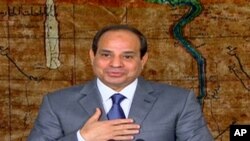Egyptian President Abdel Fattah el-Sissi said on Tuesday people in Egypt have the right to demonstrate but cautioned that protesting now could cause more harm to the country's battered economy.
Human rights activists say a law restricting protests and other security legislation enacted by Sissi in the absence of a parliament have rolled back freedoms won in a 2011 uprising that ousted autocrat Hosni Mubarak.
Sissi was elected virtually unopposed last May, almost a year after the military he then led toppled Egypt’s freely elected civilian president Mohamed Morsi. A security crackdown under Sissi's watch ended months of economically ruinous anti-government unrest and jailed thousands of Morsi’s Muslim Brotherhood supporters and liberal activists alike, including people for demonstrating without a police permit.
Sissi did not mention various security laws, which have been condemned by rights groups at home and abroad, in his speech. The occasion for his remarks was an upcoming Police Day celebration, which coincides with the 2011 revolt that forced Mubarak to step down and leave Egypt in the hands of a military council he used to chair.
“I am more keen on human rights than anybody ... But take care when you demand your rights. Take care, don't take us down with you,” Sissi told hundreds of police officers and many senior government officials.
A few months after Morsi's overthrow in July 2013, the government passed a law outlawing demonstrations without the prior approval of a police permit.
In 2011, the Police Day national holiday marked the start of 18 days of mass protests that swept Mubarak from power after 30 years of authoritarian rule.
“I never say that demonstrations are refused. We put the issue of protesting in a distinguished position... But the 90 million people [of Egypt] want to eat, drink, live and be assured about their future,” Sissi said.
He called on activists to support government efforts to improve health, education and the lives of the poor, suggesting protests would hinder such efforts.
Egypt has been trying to repair an economy prostrated by political upheaval, street protests and militant violence since the anti-Mubarak revolt. Cairo has launched economic reforms to win back foreign investors since Sissi became president.
Egypt will hold a long-awaited parliamentary election in two phases starting in March. Sissi hopes the vote will deliver stability after years of upheaval. Critics call the vote a sham given what they say is Sissi's clampdown on political freedoms.





